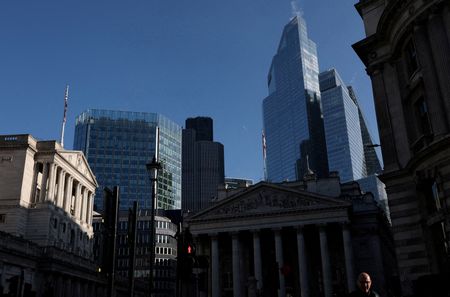By Joice Alves and Naomi Rovnick
LONDON (Reuters) -Investors are counting on the Bank of England lowering borrowing costs in December after its tight vote to leave rates unchanged on Thursday ahead of this month’s budget, which may stir up more volatility for the pound in the weeks ahead.
The BoE’s Monetary Policy Committee voted 5-4 to keep its key rate at 4.0% as Britain wrestles with still-high inflation and a softer labour market.
The central bank had been expected to leave rates unchanged, although markets had attached a one-in-three chance of a cut earlier on.
Sterling, which is around its weakest since April, rose 0.4% in choppy trading to $1.31, having dipped to $1.306 right after the BoE decision.
Britain’s 10-year gilt yield dropped 2.5 basis points to 4.44%, below Wednesday’s near-two week high. Two-year gilt yields, which are more sensitive to rate expectations, were down 3.8 bps at 3.77%, heading for their largest one-day fall in two weeks.
“The fact that it was 5-4 means that (BoE Governor Andrew) Bailey really does have the swing vote here, and the reason for a quite muted market reaction is that focus has shifted to December,” said Neil Mehta, investment grade portfolio manager at RBC BlueBay Asset Management.
“Bailey’s comments do read more tilted towards the dovish side.”
While Bailey was among those who decided to keep borrowing costs unchanged, he was the only one of the five who felt that inflation risks had moved down. However, he felt there was “value in waiting for further evidence” of this in upcoming economic developments this year, the BoE said.
FOCUS ON THE BUDGET
By December, finance minister Rachel Reeves will have delivered her second annual budget, which she signalled this week is likely to contain tax rises and other measures to keep Britain’s finances on track. Policymakers will have also seen official inflation and jobs data for October and November.
“The expectation is just joy postponed in terms of the rate cut in December,” said Amundi head of developed markets strategy Guy Steer.
“The risks for the UK right now are about what other central banks might do and how the Bank of England reacts,” he said.
“If we’re in a clear disinflationary environment in continental Europe, the UK as well, and the U.S. cuts aggressively, does the rate cut trajectory for the UK get sped up?”
Money markets show traders believe the ECB is unlikely to cut euro zone rates next year, while they expect to see at least three cuts from the Federal Reserve by next December.
The options market on Thursday pointed to a slight improvement in sentiment towards sterling, but still suggested traders remained fairly negative towards the pound.
Sterling weakened a touch against the euro, which rose 0.1% to 88.13 pence after touching its highest since May 2023 on Wednesday. London’s FTSE 100 stock index was down 0.1%, in line with European peers.
(Reporting by Joice Alves and Naomi Rovnick. Editing by Amanda Cooper, Mark Potter and Hugh Lawson)








